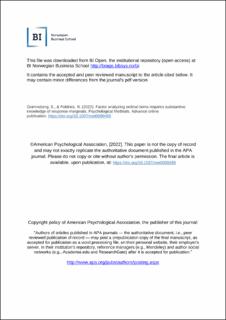Factor analyzing ordinal items requires substantive knowledge of response marginals
Journal article, Peer reviewed
Submitted version
Permanent lenke
https://hdl.handle.net/11250/3092050Utgivelsesdato
2022Metadata
Vis full innførselSamlinger
Originalversjon
10.1037/met0000495Sammendrag
In the social sciences, measurement scales often consist of ordinal items and are commonly analyzed using factor analysis. Either data are treated as continuous, or a discretization framework is imposed in order to take the ordinal scale properly into account. Correlational analysis is central in both approaches, and we review recent theory on correlations obtained from ordinal data. To ensure appropriate estimation, the item distributions prior to discretization should be (approximately) known, or the thresholds should be known to be equally spaced. We refer to such knowledge as substantive because it may not be extracted from the data, but must be rooted in expert knowledge about the data-generating process. An illustrative case is presented where absence of substantive knowledge of the item distributions inevitably leads the analyst to conclude that a truly two-dimensional case is perfectly one-dimensional. Additional studies probe the extent to which violation of the standard assumption of underlying normality leads to bias in correlations and factor models. As a remedy, we propose an adjusted polychoric estimator for ordinal factor analysis that takes substantive knowledge into account. Also, we demonstrate how to use the adjusted estimator in sensitivity analysis when the continuous item distributions are known only approximately. (PsycInfo Database Record (c) 2023 APA, all rights reserved)
